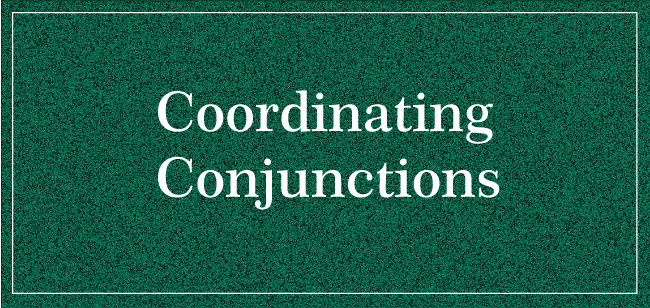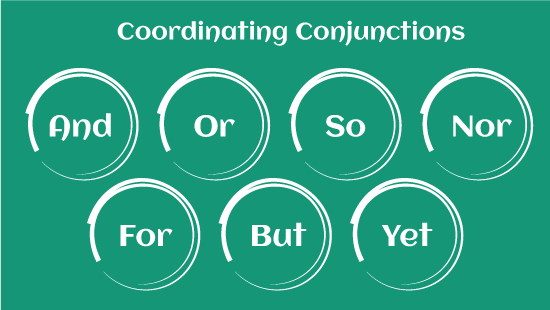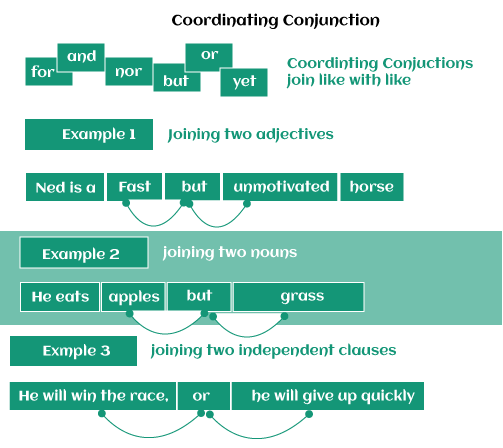Coordinating ConjunctionCoordinating conjunctions are perhaps the most common type of conjunction. They have the ability to connect words, phrases, and clauses of comparable value and grammatical rank. 
Simply defined, they bring two ideas that are equally significant together. Continue reading to discover many coordinating conjunction examples that will help you understand their purpose. A coordinating conjunction is a term that connects two parts that have the same grammatical rank and syntactic significance. The main coordinating conjunctions include for, and, nor, but, or, yet, and so. They can connect two verbs, nouns, adjectives, phrases, or independent sentences. The Coordinating ConjunctionsWhen constructing compound sentences or comparing various ideas, coordinating conjunctions is essential. Primarily there are seven coordinating conjunctions in English Grammar. They are simple to recall if you know the acronym FANBOYS, which stands for For, And, Nor, But, Or, Yet, So. Here are a few examples of how to use each coordinating conjunction. So is the only one of these seven that may be employed as both a coordinating and subordinating conjunction. The term "so", as a coordinating conjunction and is helpful in connecting two independent clauses in the same way that therefore does. Moreover, serves as a subordinating conjunction, it can connect two uneven clauses (one independent and one dependent clause) in the same way that "so that" does. For: Specifies a Reason"For" is the very first coordinating conjunction in FANBOYS. It usually consists of two distinct phrases that explain a reason or goal (exactly like "because"). As an example:
Since "for" can also be a preposition (as in "I purchased this present for you"), it can be perplexing. However, when used to describe why something is occurring, it is a coordinating conjunction. And: It Joins or Combines Two Ideas"And," the second coordinating conjunction in FANBOYS, adds something to the other. It can be utilized to link two nouns, verbs, adjectives, phrases, or independent clauses. In a statement, examples of "and" encompass:
"And" is a very popular coordinating conjunction in English. Take note as to how it connects two parts of speech or two phrases of equal worth. 
Nor: Provides a Second Negative IdeaThe third coordinating conjunction in FANBOYS is "nor." It is used to provide a second negative notion to combine the first clause's negative opinion. "Nor" is a less popular coordinating conjunction than others, but it nonetheless connects two (negative) notions.
When you use "nor," you flip the verb order in the second sentence (for example, "nor does he take lecture notes" rather than "nor he does take lecture notes." "Nor" is frequently utilized after the term "neither" as a correlative conjunction, that is, a pair of conjunctions that link ideas (for example, "I neither dislike nor love watching TV"). But: Presents an Opposing Concept"But" is the fourth FANBOYS coordinating conjunction. It contrasts two words, phrases, or thoughts of equal value. In a statement, examples of "but" include:
When the word "but" is used to signify the same thing as "except" (as in "Each one but us was welcomed"), it is a preposition, not a conjunction. When the sentences on either side reflect opposing views, the conjunction "but" is used. Or: Demonstrates an AlternativeThe sixth coordinating conjunction in FANBOYS, "or," represents an option or a choice. Like "and," "or" can also be used between two parts of speech and two phrases or clauses. As an example:
"Or," like "nor," can be used as correlative conjunction. It forms a conjunction combination with "either" (as in "Either you go into the car now or we all will be late") to connect conflicting ideas. "Either/or" connects positive notions instead of "neither/nor." Yet: Tends to Add a Differing IdeaIn FANBOYS, the sixth coordinating conjunction is "yet." It presents a contrasting concept that necessarily follows the prior thought. Here are some examples of sentences:
The words "but" and "yet" appear to be interchangeable, and in fact they are almost similar. The word "but" adds certainty to a sentence ("I'd love to snowboard, but I don't understand how"). while "yet" emphasizes that activity may change in the future ("I'd like to snowboard, but I don't understand how." Grammatically, you can substitute one for the other, but the difference in tone makes it worthwhile to take the effort to select the correct word. So: It Denotes a Result or An Effect."So" is the last FANBOYS coordinating conjunction. It denotes the preceding clause's effect, result, or consequence of action. For example:
As in "I am so exhausted," "so" could also be utilized as an adverb. In this example, however, it is not tying two terms or ideas together; rather, it is changing the word "exhausted." Before determining the part of speech of a term, make sure you understand how it functions in a phrase or a sentence. Forming Compound SentencesWe can create compound sentences by employing coordinating conjunctions. A compound sentence is one that comprises of two or more independent clauses. An independent clause refers to the group of terms which can function as a coherent sentence on their own. Here are two examples of independent clauses: Richard's favorite color is Orange. Emerson's favorite color is Purple. Coordinating conjunction can connect these two simple statements to generate a longer, more complicated sentence: Emerson's favorite color is purple, while Richard's favorite color is orange. But wait, there's more! Coordinating conjunctions can also be used to produce compound-complex sentences when combined with subordinating conjunctions. Independent and subordinate clauses combine to form compound-complex sentencesIshita was the one who consumed the last piece of chicken, but I can't chastise her for eating it because it was too yummy. Series and lists Coordination conjunctions are frequently used to create a list or series with more than two members: My buddies are Jeffrey, Megan, and Louie. Shall I take a left, a right, or a straight path ? 
Commas and Coordinating ConjunctionsSome of the instances of coordinating conjunctions are preceded by a comma, and some are not. If coordinating conjunction connects two separate, independent clauses, it should be accompanied with a comma. Independent clauses can function as whole sentences on their own. "Television is a fantastic escape, but it clashes with my work," for example. Since they are two separate clauses, they must be combined together using a comma and coordinating conjunction. The absence of a comma may result in run-on sentences. In the other case, you would not need a comma when using a coordinating conjunction to join two things that aren't independent clauses. As an example, No commas: We really like to read and write. Please give me a pink or turquoise crayon. The stew was spicy but tasty. Can a Coordinating Conjunction Start a Sentence?Another common misunderstanding is that starting a phrase with a coordinating conjunction is improper. Although this is a fantastic rule, still it is not a universal rule of grammar as far as your statement remains connected to the one before it. As an example:
And,
You should restrict the number of times you begin a sentence with athe coordinating conjunction. However, doing so is not improper, especially if it would break up an extremely lengthy sentence into more intelligible bits. It's a good approach to change up your writing style if you need to. Conjunctive Adverbs vs. Coordinating Conjunctions"Wait!" you may be thinking. There are many more coordinating conjunctions than the seven coordinating conjunctions!" If you are thinking why terms like "however," "therefore," and "also" do not fall under the category of coordinating conjunctions, then, the reason for the same is that they are conjunctive adverbs. Conjunctive adverbs connect two clauses with the help of a semicolon or in a new sentence. Also, alter the initial clause with the subsequent. ConclusionThus, conclusively, coordinating conjunctions are the easiest to identify and master of all conjunctions. Understanding how they work will help you write better. There are numerous ways to begin if you're ready to learn about different forms of conjunctions. With these conjunction basics, you'll be able to learn its proper place while also reinforcing your acquired grammar knowledge.
Next TopicCorrelative Conjunctions
|
 For Videos Join Our Youtube Channel: Join Now
For Videos Join Our Youtube Channel: Join Now
Feedback
- Send your Feedback to [email protected]
Help Others, Please Share









